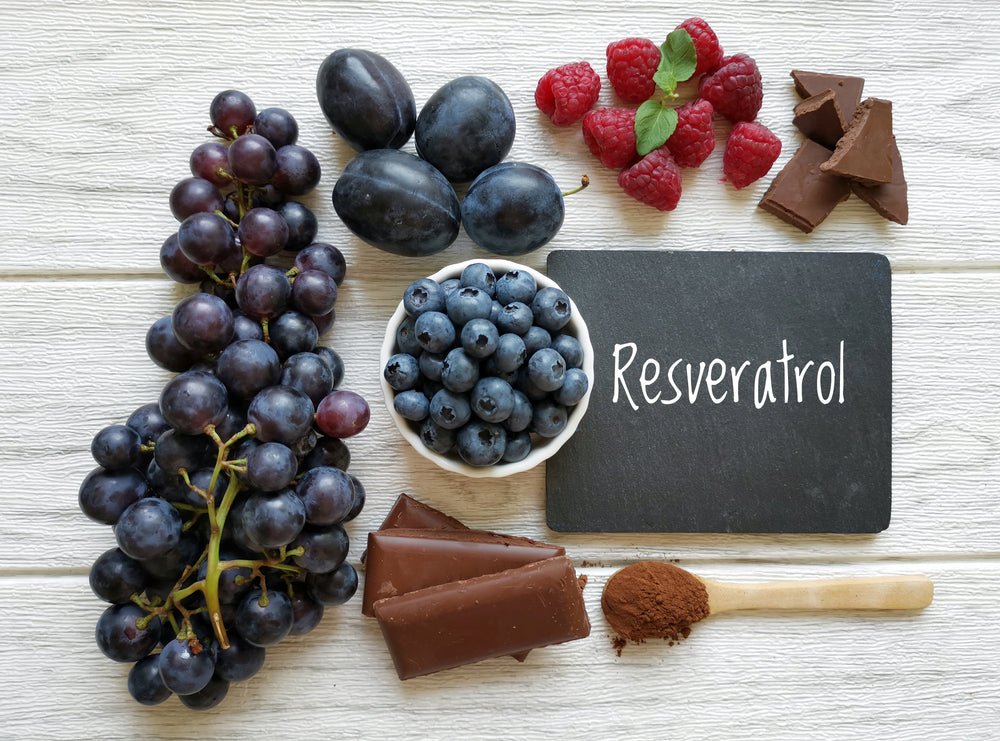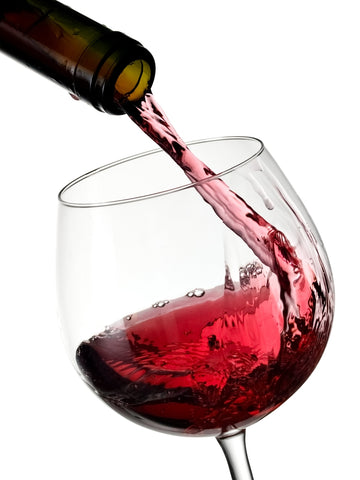Your cart is empty
Free shipping on all US orders


Free shipping on all orders

What do you know about resveratrol? Over the past two decades, the popularity of this compound has absolutely skyrocketed, and for good reason.
First mentioned by Dr. OZ during one of his health segments on television, resveratrol might be a good addition to a healthy diet and lifestyle plan.
aIn this blog post, we're going to discuss all you need to know about resveratrol, so you can determine if it looks like a good match for your health goals.
Resveratrol is a type of natural phenol and antioxidant compound naturally found in grape skin, berries, peanuts, and other plants. It works mainly by helping to protect our cells from environmental damage.

It was popularized as being found abundantly in red wine, however, there is actually more resveratrol found in grape juice and skin than in wine.
Scientists have studied resveratrol's mechanism of action in detail, revealing that it works on mainly two levels: an anti-oxidative level which protects the body from disease-causing oxidative damage, and an anti-inflammatory level which helps to reduce inflammation and support healthy tissue regeneration.
Its active constituents, including antioxidants such as catechins and anthocyanidins in combination with other compounds such as proanthocyanidins and hydroxycinnamates, are responsible for these beneficial actions.
Studies have established resveratrol’s ability to prevent cancer by interfering with the signal transduction pathways that promote tumor growth and development. It does this by suppressing the expression of various proteins known to be involved in the growth of tumors. By doing so, it prevents the uncontrolled multiplication of cells and therefore inhibits the formation of tumors in different areas affected by cancer.

Grapes also contain histone deacetylase inhibitors which help fight against cancer cells.
Furthermore, resveratrol also activates biological responses already present in our body which help fight off cancerous cell invasions or target existing carcinogens within our system. All these mechanisms collectively enable resveratrol to act as a promising agent against cancer.
Turns out, resveratrol is REALLY good for your brain, too. It has been shown to help protect against oxidative stress in the brain cell environment, reduce inflammation, and improve cognitive performance. Additionally, resveratrol's antioxidant effects may reduce the level of apoptosis - or programmed cell death - that can occur from sustained oxidative stress or traumatic brain injury, or stroke.
While more research is needed in order to better understand its exact action and potential therapeutic use, resveratrol appears to be a very promising natural compound for protecting the central nervous system.
One of the most noteworthy applications of resveratrol is its ability to combat cardiovascular disease, particularly by lowering blood pressure. Research suggests that when consumed daily over a period of time, this powerful compound can significantly reduce systolic and diastolic blood pressure levels, fortifying heart health.
Resveratrol works by dilating arteries (vasodilation) which increases oxygen and nutrient supply throughout the body, an important factor in maintaining healthy blood pressure levels as well as overall well-being.
The lipid-lowering action of resveratrol is due to its ability to block the synthesis of cholesterol in the liver. At the same time, it enhances insulin production and sensitivity which further reduces cholesterol levels by improving HDL (high-density lipoprotein) levels.

Besides regulating and mitigating the effects of high cholesterol, some studies suggest that resveratrol may also be capable of reducing atherosclerotic lesions, which are accumulations of plaque that lead to restricted blood flow in major arteries. Combined with a smart hypolipidemic diet and the effect should be significant.
The antioxidant activity of resveratrol is not limited to just the inside of your body; it can also help improve skin health and appearance. By inhibiting inflammation, reducing damage from UV rays, and improving circulation, resveratrol can do wonders for your skin.
It is especially beneficial against acne as its anti-inflammatory properties reduce redness and irritation associated with breakouts. Furthermore, it also helps to protect the skin’s collagen which keeps skin looking healthy and young for longer periods of time, as this protein is key to maintaining smooth and wrinkle-free skin.
Resveratrol is an incredibly beneficial supplement that may help enhance physical performance. Studies have shown that taking resveratrol supplements prior to physical activity improves metabolic efficiency, increases muscle exertion capacity, reduces fatigue, and accelerates recovery time after exercise.
This means that athletes who use resveratrol combined with Foundation; creatine and Peak ATP as a part of their fitness routine can go further and recover faster than those who do not.
One of resveratrol's most important benefits includes improved insulin sensitivity and glucose metabolism. This can lead to improved diabetes management.
Diabetes is characterized by impaired insulin function and elevated blood sugar levels, leading to a range of complications, including cardiovascular disease, neuropathy, and kidney disease. Insulin resistance is a key factor in the development of type 2 diabetes, so improving insulin sensitivity can be an effective strategy for diabetes management.
Resveratrol supplementation can help improve insulin sensitivity and glucose metabolism, reducing the risk of type 2 diabetes. In animal studies, resveratrol supplementation has been shown to increase insulin sensitivity in fat and muscle cells, leading to improved glucose uptake and utilization. This can result in lower blood sugar levels, reducing the risk of diabetic complications.
Furthermore, resveratrol has been shown to improve glucose metabolism in the liver, reducing the production of glucose and increasing glucose utilization as well. This can also help to improve insulin sensitivity and glucose metabolism, further reducing the risk of type 2 diabetes.
In addition to its effects on insulin sensitivity and glucose metabolism, resveratrol has been shown to have other benefits for individuals with diabetes, including reducing oxidative stress and inflammation in the pancreas, improving cardiovascular health, and reducing the risk of associated diabetic complications.
However, it is important to note that while resveratrol supplementation may offer potential benefits for diabetes management, it is not a replacement for traditional diabetes treatments, such as medications and lifestyle changes, at least not without your doctor's advice.
Resveratrol has been shown to positively affect mood and well-being. This powerful antioxidant has been linked to improved neural connectivity, which can impact the way people feel and think.

In addition, resveratrol increases oxygen flow to the brain, sharpening mental clarity and focus while decreasing symptoms of depression and anxiety.
As resveratrol can cross the blood-brain barrier, consuming it can directly influence neurological health. While diet and lifestyle are important aspects of long-term physical and emotional health, incorporating dietary supplements such as resveratrol may be beneficial for those suffering from depression and other mood disorders. With support from clinical studies on its neurological benefits, adding small amounts of resveratrol to one's daily routine may help improve overall well-being.
Resveratrol has natural antimicrobial properties that can help keep the body safe from bacteria and fungi. Studies have found that resveratrol is an effective treatment for various fungal infections, including candidiasis, aspergillosis, and cryptococcosis.
It also has antibacterial benefits which make it effective against certain types of bacteria, including E. coli and Streptococcus pneumoniae.
While we would stop short of saying that it can act as a remedy for such infections, what it could do is bolster the immune system and help it fight off any foreign pathogens more efficiently.
Some skincare formulations include resveratrol in their formulations, serving to not only reduce oxidation but also possibly help control trouble spots that may be worsened by those pathogens.
Resveratrol consumption can have a profound effect on promoting longevity, and having an anti-aging effect on the body. Some studies suggest that consuming resveratrol activates a type of protein in the body known as sirtuins, which help regulate factors such as metabolism and inflammation levels. The sirtuins do this by gluing to DNA and controlling other proteins’ access to genes in order to activate or deactivate certain repair activities.

When activated, sirtuins create favorable biological conditions for increased lifespan and decreased signs of aging. Research suggests that not only does resveratrol consumption support the production of sirtuins, but it also helps them endure for a longer duration with anti-aging capabilities.
Then, there's also the fact that resveratrol has been shown to have anti-inflammatory effects, reducing oxidative stress and improving cardiovascular health. These effects are also thought to contribute to its anti-aging effects by reducing the damage that occurs in cells over time.
Moreover, resveratrol has been shown to have protective effects against several age-related diseases, including Alzheimer's, cancer, and cardiovascular disease. It has also been linked to improved insulin sensitivity and glucose metabolism, which can help prevent the development of type 2 diabetes.
So many things are optimized under resveratrol's presence that synergistic effects are created, all of which contribute to a better quality of life and improved longevity.
Would it be fair to say that this might be the true fountain of youth?
Field Of Greens- our flagship superfood powder contains natural resveratrol in small amounts, along with tons of nutrients and phytocompounds needed to promote health.
Red Grapes- the most well-known source of resveratrol. Blueberries, cranberries, and black currants also contain small amounts of this antioxidant.
Resveratrol supplements- these are typically derived from Japanese knotweed or grapes and can be found in pill or powder form.
Wine- red wine is a popular source of resveratrol, but the amount present varies depending on the grape variety used to make it (but is generally low). White wines generally don’t contain any significant concentrations of resveratrol.
Dark chocolate- cocoa solids naturally contain some levels of resveratrol, although much less than red grape skins or Japanese knotweed extracts.
Peanuts- certain varieties of peanuts also contain small amounts of resveratrol.
The most effective form of resveratrol is trans-resveratrol. Trans-resveratrol is the bioactive form of resveratrol found in foods and dietary supplements that is readily absorbed by the body. It has been studied for many years to determine its potential health benefits, and it has been proven to be superior to the cis version in numerous clinical studies.
Yes, resveratrol is considered very safe when taken at the recommended doses. However, as with any supplement, it’s always best to consult with a physician or pharmacist before use to determine if it’s right for you.
The recommended dose of resveratrol is typically between 250mg to 500mg per day. However, this can vary depending on individual needs and goals.
A glass of red wine contains roughly 0.2-1.5mg of resveratrol, which is much less than the amount found in a serving of resveratrol supplement form.
Therefore, it’s recommended to take a supplement if you want to maximize the potential benefits of this powerful antioxidant (and because we don't want you downing dozens of glasses of wine to get your fix!)
Generally, resveratrol is well tolerated by most people and no serious side effects have been reported. However, some mild digestive issues such as nausea, bloating, or stomach discomfort may occur in rare cases.
Allergic reactions including itching around in the buttock area are also a possibility, but a rare occurrence.
There is also a risk of estrogenic side effects occurring in men as it is classified as a phytoestrogenic compound.
Using a supplement containing resveratrol is a solid bet on your future health. While it is possible to get it from naturally occurring foods, the amount is negligible. Your daily dose of Field Of Greens allows you to get a small amount of resveratrol, when combined with other natural sources, can add up to a modest number.
If it means living a longer life, what have you got to lose?